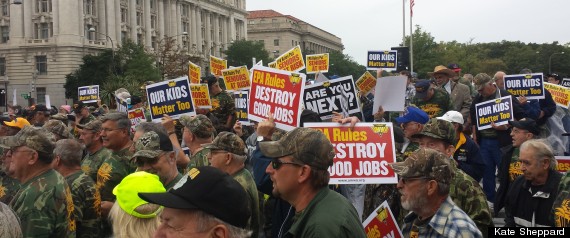
WASHINGTON -- The United Mine Workers of America came to Washington on Tuesday with a message for the Obama administration: We will not be forgotten.
The union miners, who came by bus from Pennsylvania, Ohio and West Virginia, held a rally outside the Environmental Protection Agency's headquarters in protest of new regulations on greenhouse gas emissions from power plants that the agency proposed in June. The rules are part of the Obama administration's plan to curb the greenhouse gas emissions that are causing the planet to heat up.
Members of the International Brotherhood of Boilermakers and the International Brotherhood of Electrical Workers also attended the rally.
"We are fighting for our livelihood," James Gibbs, an at-large vice president at UMWA, told the crowd. "We have to let the president know, we need to let both parties know that we will support candidates that support us."
Organizers said about 700 people made it to Washington for the protest, and another 50 or so were on a bus that arrived late. They carried signs that read "EPA Rules Destroy Good Jobs" and "EPA Rules Put Seniors At Risk," and some wore shirts that said "Stop The War On Coal." UMWA leaders expressed frustration that the union had worked on behalf of progressive causes like improved labor laws and fair wages, and had committed money and manpower to elect Obama in 2008. (The group did not endorse either candidate in 2012.)

"We fought for those progressive causes, and there are people today in the progressive movement who have forgotten us," Daniel Kane, UMWA's secretary-treasurer, told the gathered crowd. "If you try to foist this devastation on Appalachia, on our brothers and sisters, we will remember."
UMWA President Cecil Roberts accused the EPA of essentially passing a new "law" without the approval of Congress. "What's going on now is the EPA is passing laws, and we all have to abide by them," said Roberts. "These rules could not pass a vote in the United States Congress."
"These are the best jobs in Appalachia," said Roberts. "No bureaucrat has the right to do this." He also argued that the U.S. should not go forward with emissions regulations while countries like China don't have similar limits in place.
Roberts is probably right that Congress, as it is currently constituted, could not pass a new law to deal specifically with greenhouse gas emissions. The House passed such a law in 2009, when Democrats were in control, but it never passed in the Senate.
Instead, the new rules were issued under the Clean Air Act of 1970 in response to a Supreme Court ruling in 2007 that determined that EPA had the authority to regulate greenhouse gas emissions under the existing law. Under the draft rules, the EPA would set an emissions limit for each state based on its energy mix, and each state would develop its own plan to meet those standards.
While the number of coal-mining jobs has declined steeply in recent decades, those trends were underway before the EPA drafted its new regulations. Mechanization of mining operations and the shift from underground to surface mining operations have been major factors, as has the lower price of natural gas. A recent report from the liberal Center for American Progress looked at the economic factors affecting coal jobs, beyond EPA's new rules.
But many of the miners at Tuesday's rally blamed the EPA rules for continued job losses. "They have too much power, that's what I think," Tom Powell, a 59-year-old retired underground miner from Crooksville, Ohio, told The Huffington Post.
Mike Mallernee, a 69-year-old retired miner from the UMWA's Local 1188 in Zanesville, Ohio, left home at 3 a.m. to attend the rally. He said he was there to support the union, and because he felt the EPA rules were "too strict." "If you shut down all the coal-fired power plants now, what would you use for electricity in the U.S.?" said Mallernee.
The EPA defended its new rules Tuesday, arguing that coal will not be eliminated from the U.S. electricity sector. "Coal will remain a critical part of America's energy mix for the foreseeable future. In 2030, it will represent a third of our nations' energy mix," said EPA press secretary Liz Purchia in a statement to HuffPost. "EPA's carbon pollution proposal provides each state with enormous flexibility in determining how to meet its pollution reduction goals, and does not mandate the retirement of any coal plants."
Purchia said that many retirements for coal-fired power plants are already happening, not because of the new rules, but "because of ongoing economics -- regardless of this plan, largely as a result of aging equipment and market forces, including greater energy efficiency and cheap natural gas." She added that the average U.S. coal plant is 42 years old, and plants have adapted to pollution limits in the past by finding "new ways to innovate."
The EPA said it has already received more than 1 million comments on the proposed rules, and recently pushed back the deadline for comments to Dec. 1 in order to give parties more time to weigh in.

